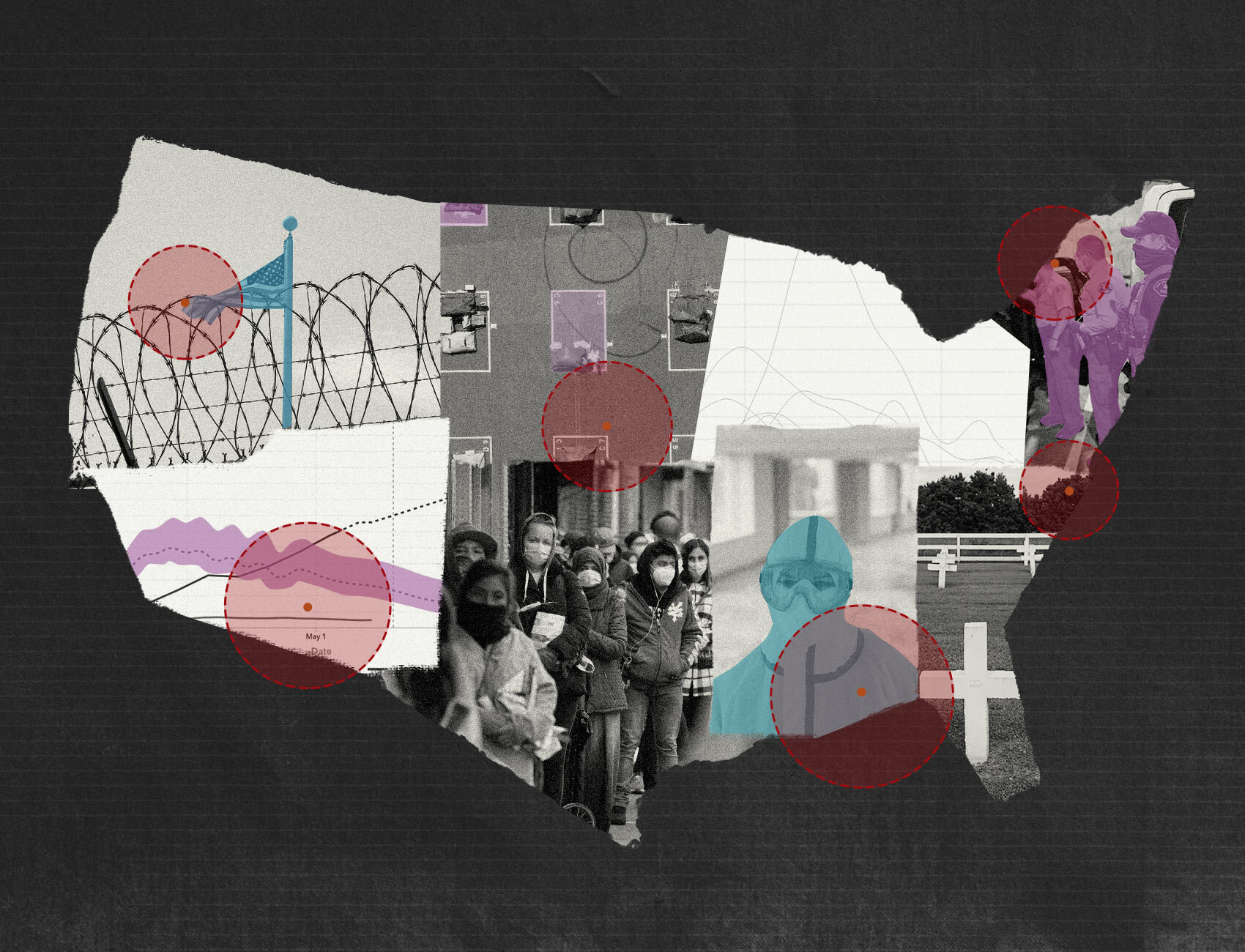Coronavirus In Jails And Prisons
Advocates sue to get people out of ’deplorable’ Detroit jail, Oregon prisons see more COVID cases while governor stalls on commutations, and botched transfer depletes California’s prison fire camps.

Weeks before the first reported cases of COVID-19 in prisons and jails, correctional healthcare experts warned that all the worst aspects of the U.S. criminal justice system — overcrowded, aging facilities lacking sanitary conditions and where medical care is, at best, sparse; too many older prisoners with underlying illnesses; regular flow of staff, guards, healthcare workers in and out of facilities — would leave detention facilities, and their surrounding communities, vulnerable to outbreaks. Despite those early warnings, even jails and prisons that believed they were well-prepared have seen a rapid spread of the virus. On a daily basis over the next several months, The Appeal will be examining the coronavirus crisis unfolding in U.S. prisons and jails, COVID-19’s impact on surrounding communities and how the virus might reshape our lives. Read Thursday’s update from last week.
Built in 1929, Detroit’s Old Wayne County Jail is one of the oldest jails in the U.S. A 2015 report by the Detroit Free Press described the facility as “deplorable.” The story leads off with a reporter’s observations during a tour of the jail:
Malfunctioning and antiquated fire alarm systems.
An infirmary without basic medical equipment.
The heavy stench of urine and body odor.
Outdated video recording equipment for security cameras.
Eight to 10 inmates sharing a single toilet, with no privacy, a short distance from their bunks.
Wayne County Circuit Judge Timothy Kenny had ordered the county to develop a plan to fix the jail, something the jail’s chief agreed needed to be done. But those plans have lagged. In May, prisoners and several civil rights groups sued Wayne County over jail conditions and urged Kenny to order the release of medically vulnerable prisoners. Thirty people housed at the jail had tested positive for COVID-19 and two jail physicians, a deputy and a jail commander had died from the virus, according to the lawsuit.
The prisoners and civil rights groups hired Dr. Fred Rottnek, a professor and director of Community Medicine at Saint Louis University and the former medical director of the St. Louis County Jail, to tour Wayne County’s three jails and write an expert report.
Last week, Kenny struck Rottnek’s report from the lawsuit after Wayne County attorneys argued that the doctor lacked expertise in COVID-19 and infectious diseases.
Free Press reporter Angie Jackson writes that the county moved to oppose Rottnek’s report only after the Free Press sued to have it unsealed.
Rottnek described the conditions in the Old Wayne County Jail as “unconscionably dangerous,” Jackson writes. He observed what appeared to be black mold in the showers and a ventilation system partly blocked by debris. While prisoners were wearing disposable surgical masks, the masks “were fraying and dirty.”
Rottnek recommended that people be transferred out of the Old Wayne County Jail “as soon as possible.”
Oregon Public Broadcasting reports that more than 3,100 people incarcerated at the Snake River Correctional Institution in Eastern Oregon have been quarantined after a COVID-19 outbreak at the prison. Attorneys told reporter Conrad Wilson that they’ve been unable to reach their clients. One attorney told Wilson that when she called, she was told that “no legal calls would be allowed until July 11, at the earliest, due to COVID.”
Oregon Gov. Kate Brown has been under pressure to release people from the state’s jails to create enough space for social distancing. In April, the Oregon Department of Corrections (DOC) told her she’d need to release roughly 40 percent of state prisoners. In June, Oregon lawmakers presented her with a multi-step plan for releasing nearly 2,000 people from state prisons.
On June 25, Brown agreed to commute the sentences of 57 people out of a list of 61 presented to her by the DOC.
“Three of the inmates Brown denied are set to be released in the next week anyway,” Wilson wrote.
Appeal contributor Jon Ben-Menachem reports for Shadowproof that officials at MCI Norfolk in Massachusetts have placed several housing units on lockdown—but only after an unknown number of prisoners and staff came into contact with a prisoner who collapsed and later tested positive for COVID-19.
“Incarcerated people also allege that over a dozen people have been placed in solitary confinement for COVID-19-related reasons, and that corrections officers have threatened people with solitary confinement if they refuse COVID-19 testing,” Ben-Menachem writes.
The prison also has a history of repeated serious environmental health violations. “This is the same prison where the water notoriously ran the color of instant coffee,” one advocate told Ben-Menachem, referring to a prisoner who died in 2018 from liver cancer tied to MCI Norfold’s contaminated drinking water.
*The Sacramento Bee reports that California has placed 12 of the state’s 43 prisoner fire camps on lockdown after an outbreak at the California Correctional Center (CCC) in Lassen County. The prison serves as the training center for fire crews. State prison officials tell reporter Jason Pohl that until the lockdown lifts, only 30 of the state’s 77 inmate crews are available to fight wildfires. CCC had reported no cases of COVID-19 until four infected prisoners were transferred last month from San Quentin, which has experienced the largest outbreak among California prisons after a botched transfer in late May. CCC is currently reporting 223 active cases of COVID-19.
*All but three of 90 people incarcerated at the McKinzie Jail annex in Nueces County, Texas, have tested positive for COVID-19, KHOU reports.
